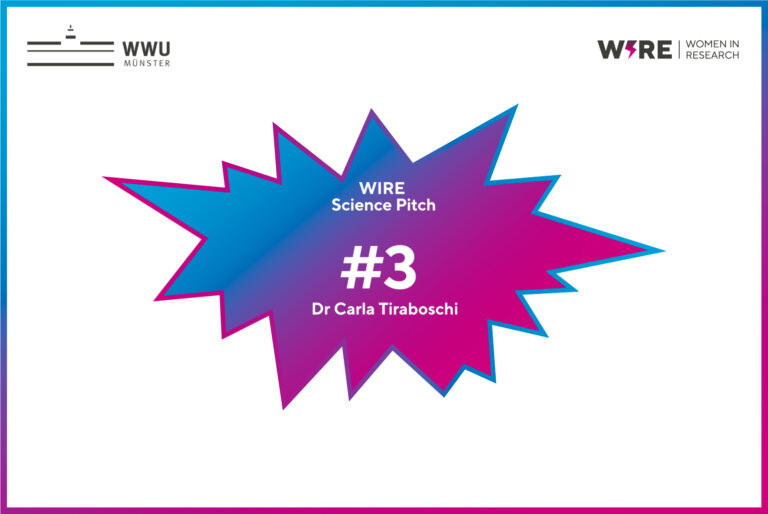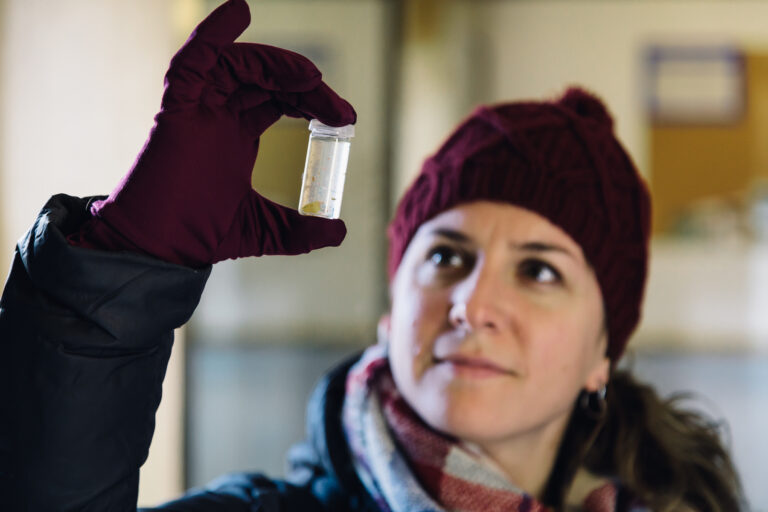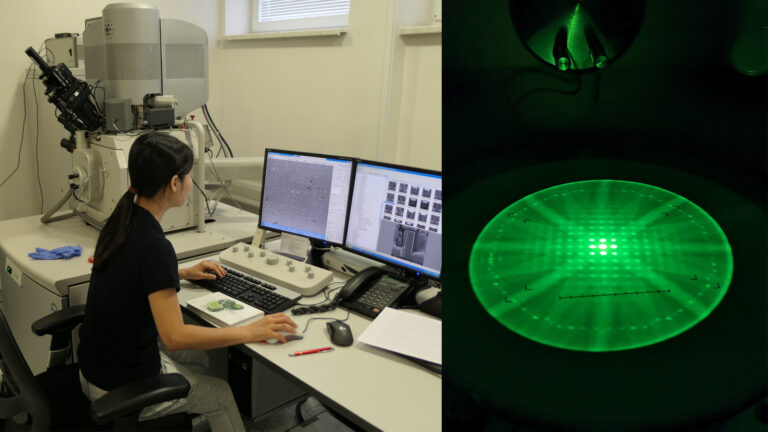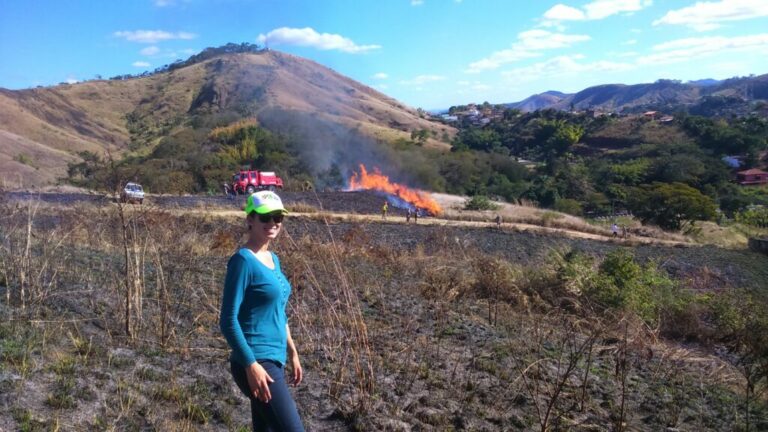
Archaeologist and Historian Dr. Aleksandra Kubiak-Schneider: “We Learn From the Past About Today and the Future”
In the series “33 questions” we introduce, in no particular order, our WiRe Fellows who are currently working on a research project here at the University of Münster. Why 33? Well, if we think of the rush hour of life, it is kind of the age that lies in its middle. And we also like the number😉.
Today we are speaking with Dr. Aleksandra Kubiak-Schneider: archaeologist, historian of religions, ancient historian, epigraphist (all-in-one) in the area of the Near East after the conquest of Alexander the Great. She’s passionate about Palmyra, the ancient city on the Syrian Desert with splendid ruins, and that passion extends to deciphering ancient inscriptions in various dialects of Aramaic.

1. What motivated you to work in the field of Antiquity?
When I was 10, bored sitting at home on a rainy and dark evening, I stumbled upon a book about geography of different countries and started to read about Egypt. It was enough to light up my passion for archaeology, ancient history and ancient languages. Since then I wanted to be a discoverer and learn all these fascinating languages and scripts like ancient Greek, Latin, and hieroglyphs. The biggest motivator was my history teacher in high school, Dr. Hanna Skierczynska, who helped to maintain my interest and encouraged me in this slopey path, helping in preparations for the hard entry exams.
During my archaeology studies, my passion changed from Egypt to the Graeco-Roman Near East thanks to the epigraphy classes and my first excavation season in Palmyra in Syria in 2005. There, I fell in love with its history, architecture, texts and localization in an oasis full of palm trees somewhere in the middle of the Syrian Desert. And nowadays, my motivator is my husband (also a Near-Eastern archaeologist) who provides me with an overabundance of papers and who is the best partner for daily scientific exchange.
2. Describe your daily work in three words.
Not 3 words but the best description of my work:
Matching puzzle pieces without any reference picture or knowledge about the number of elements.
3. Describe your research topic in three words.
Understanding ancient beliefs.
4. A good Antiquity scholar needs …?
… to be curious and open minded. The open mindedness helps to move away from the stereotypes when looking at other cultures through the western eye, and curiosity is a basic element of making research and going forward in learning about different domains of life.

5. What is the best experience you have had as a scientist/researcher?
Reading, touching and enjoying inscriptions directly from the original objects in the original places.
6. What was your biggest research disaster?
Doubting myself as a researcher and wanting to quit every time when it does not go as I have planned.
7. Which (historical) important scientist would you like to have dinner with? What would you ask?
I think, maybe banally, that it would be Maria Sklodowska-Curie, we would chat in Polish about being women researchers and combining scientific life with family and kids. I would ask her for some advices in the matter of sharing time with kids and doing science, because it is very often very hard to connect these spheres of life.
8. If time and money were no object: Which research project would you like to do?
Excavating below the remains of the sanctuary of Bel in Palmyra (if time really was no object and I could wait until the conflicts in Syria are over).

9. What is your favorite research discipline other than your own?
Definitely astronomy with the planets, stars and this big unknown question – are we alone in the Universe?
10. What do you consider the greatest achievement in the history of science/your field?
I’d say deciphering ancient scripts, like cuneiform, Egyptian hieroglyphs and Phoenician writing in the XIX century. Thanks to that, we have access to the ancient documents and the richness of information about different domains of life of the people in the past and to their thoughts, beliefs and perception of the world (as well as to the culinary recipes, e.g. how to make a beer).
11. Which experience in the world of science disappointed you most?
There are two such experiences which disappointed me most in the world of science. First one is jealousy of the other researchers (mostly more experienced colleagues) who do not want to build any network, exchange with the young researchers and who keep running the rivalry instead of bringing help and encouragement. Second is non-constructive critics without any reasonable explanation or argument, just pretending that the criticizer is the all-knowing person simply by having the title of a professor.
12. What was the funniest moment you had in science?
I was attending a conference on Palmyra with my (back then) 5-month-old daughter in the carrier. A colleague of mine started to presenting his topic with a calm, steady voice making my daughter falling asleep like it was the best lullaby in the world. Afterwards, during the break he wanted to check how she enjoyed his speech, but a quiet snore came from the carrier located on my chest. He is still laughing that she was the best critic of his research.
13. How did you survive your PhD time?
I want to know that too 😀 After my final exam I had to take an all-inclusive holiday abroad to process this time out.
14. What direct or indirect relevance does your research have for society?
At first glance, people may ask why at all bother about the old, dead, stuff, but my research has an input in the question of multiculturality and religious tolerance. I am studying the ancient traditions visible in the great religions of nowadays: Islam, Christianity and Judaism, like the concept of divine mercy. They are based on the same roots and share similar concepts, linking to the people who believed in more than one god. It opens an inter-religious dialogue and leaves space for acceptance and understanding instead of intolerance and discrimination. I am also working on the communication strategies (rituals, prayers) within the ancient religions which reveals similar strategies as in modern times, showing that religion is a big part of human nature and that we need rhythms and celebrations in our lives. I used to say that we learn about today and the future from the past. Through my study on the two gods from polytheistic societies I can follow the changes in their perception when Christianity and Islam were on the rise, therefore following human behavior within new religious phenomena.
My research turns eyes to the world cultural heritage and its preservation, with the goal in making people aware or their history and culture. The lack of this consciousness about historical identity and roots (where do we come from?) leads to the destruction of monuments like those in Syria, Iraq, Afghanistan and other places in the world. Keeping the studies on Antiquity at the forefront, especially concerning the endangered zones, can prevent acts of intolerance such as destruction and lootings of the ancient sites in 2015 in Syria and Iraq.

15. How did you imagine the life of a scientist / researcher when you were a high school student?
Exactly like it is: reading a lot, traveling and living abroad, doing important things 🙂
16. Is it actually different? In what way?
Different is to have all the time a mobile office and being here and there without any stable place of attachment. And not going on the excavations because of the war and conflict reasons.
17. What do you like most about the “lifestyle” of a scientist? And what least of it?
I like discovering new places and new people to work with, presenting at conferences, being flexible in time and place of work. I don’t like the unknown: what comes after this project? Where will I be? How can I (re)organize our life as a family again? What if I don’t get this position/grant/job? And I don’t like the attitude of others (close and distant family, acquaintances), who are not related to academics, asking all the time if you couldn’t choose something more productive or financially stable.
18. Do you think your career would have evolved differently if you were a man?
Absolutely yes (for many reasons)!
19. If you were the research minister of Germany, what would you do to improve the situation of women in science?
This question is too difficult for me to answer. I see the dynamics in the change of inclusion of women in the research and in my opinion, it goes in the right direction. I would maybe set an accent on the family issue and possibility to create a space (or at least positive atmosphere) at the universities for working mothers with babies (or small kids).
20. If you had a daughter, what would you advise her not to do?
Actually, I have a daughter and I would advise her not to bother with the people who don’t accept her and not to let herself be taught that certain domains are for men and other for women. She can be whomever she wants to become!
21. What is the biggest challenge for you when it comes to balancing family and career?
The first of the biggest challenges was lockdown last Spring in France and working with my daughter on my lap, second one was dealing with intolerance and judgmental character of the French education system in the outcome to juggle with my husband with the care of our kid during the day when I was at work the whole day, and third one is: when I will have time to clean the house when there are always much more important things to do.
22. How often do you as a friend / partner / mother / daughter feel guilty when you have to meet a deadline again?
Often, and it is a huge stress factor.
23. How did you imagine your future as a child? What profession did you want to pursue?
When I was in kindergarten, I wanted to be a nurse. Then in primary school I became interested on astronomy (it went to oblivion after my first troubles at physics and mathematics), but when I was 10 I wanted to be exactly who I am now: working with the mysteries of the past.
24. How do you keep your head clear when you are stressed?
Dancing, going out with friends and speaking with other people.
25. What is your favorite German word?
My German is affected by living in Austria for quite some years already. My favorite by far is: Oachkatzlschwoaf, which means: “tail of a squirrel” – it’s a classic Tyrolean tongue breaker! I like also the expression “Das ist mir Wurst” to say I don’t care.
26. What makes you most happy about the world?
Mountains, nature and good food.
27. What or who inspired you to become an Antiquity scholar?
What: a book on geography I read when I was 10, TV programs and the stories on deciphering the ancient languages.
Who: my history teacher in high school, colleagues in my field who do amazing things and all the people who said: it is too difficult and not a feasible way of living (as in, you will not gain a lot money-wise).

/ © Dr. Aleksandra Kubiak-Schneider
28. Which of your traits bothers you the most in your daily work?
Panic: what if I don’t do it on time/right/in an interesting way? Choleric character and low, contstant level of being frustrated when something doesn’t work as I want. Plus having always not enough time for it all.
29. What worries you most about the world?
Sicknesses and health issues, especially of my loved ones. Also terrorism and wars.
30. Your favourite TV series?
The Simpsons (to laugh and relax), Gilmore Girls (something girlish), The Mentalist (to take part in solving the mysteries).
31. If someone asks you about your age, what do you respond spontaneously?
The truth. But I like to see shocked faces of shopkeepers when I show my ID in a Polish market when I buy beer or wine.
32. Which hobby have you given up for a life in academia?
None!
33. If you could travel in time: in which epoch and at which discovery or event would you have liked to have been there?
I would love to travel back in the Roman times (1st-3rd century CE) Palmyra to observe and experience their religious life, ask them about their beliefs, admire their buildings still in the intact state.
34. What are the advantages and disadvantages of doing a Research@home-WiRe-fellowship?
A huge advantage is being able to stay at my place and having a family stability for this academic year – without moving out and organizing everything abroad. Disadvantage is not to be in Münster, meeting people in real life (other fellows and my supervisor) and having no calm, clean office.
35. What is your favourite place to relax from research during Corona?
Mountains, forests around my place and my bed in the evening.







